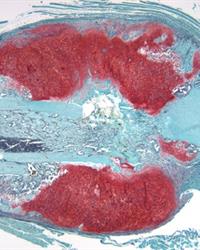Welcome to Zuscik Lab
Lab Director, Michael Zuscik, PhD
Welcome to Zuscik Lab

Michael Zuscik, PhD
Mack Clayton Professor
Vice Chair of Research
Advancing Orthopedic Research: Exploring Obesity Impact, Microbiome Role, and Disease-Modifying Treatments"
The central focus of our research can be divided programmatically into three parts: 1) Study of the pathological impact of obesity on the skeleton, particularly bone and joint health and fracture healing, 2) Elucidating the role of the gut microbiome in posttraumatic and obesity-associated osteoarthritis, and 3) Development of disease-modifying treatments to address joint degeneration in osteoarthritis. Our work spans from bench to bedside, involving basic molecular-cellular biology and microbiology in microbial and cell culture systems, state-of-the-art animal models of disease, and human clinical trials. Our aim is to pursue a basic study of skeletal homeostasis and disease, using information gained from that work to develop therapeutic strategies addressing key orthopedic challenges including fracture non-union, osteoporosis, and osteoarthritis.
Projects

Impact of obesity on the skeleton: Key discoveries made by our group have documented the pathological impact of obesity on the musculoskeletal system. We have begun to understand the tissue and molecular basis underlying accelerated OA, delayed bone healing, and reduced skeletal bone mass in the obese context. We have documented that insulin resistance and chronic inflammation are key mechanisms of pathogenesis, and we have now discovered that dysbiosis of the gut microbiome in obesity may be a key root cause of these orthopedic problems. Identification of the tissue and molecular mechanisms in each of these situations has energized the assembly of a programmatic team of investigators that work collaboratively to unravel the novel idea that gut microbiome-skeletal interactions are important in homeostasis and disease.
View All Projects
Publications
Loading items....
Contact Us
Contact Us
Zuscik Lab
12800 East 19th AvenueRC1N Room 3107
Aurora, CO 80045